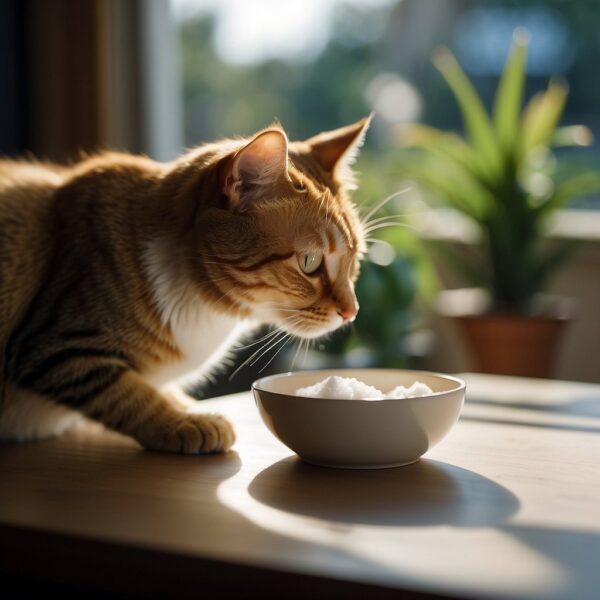
Cats and Sugar? Not a Good Combination
Cats, as obligate carnivores, have dietary needs that are significantly different from those of humans. When it comes to sugar, it’s commonly known that cats do not require it for energy in the same way humans do, and it doesn’t hold any nutritional value for them. Can cats eat sugar? While sugar is not directly toxic to cats, it is unnecessary in their diet and can lead to health issues if consumed in large quantities.
Since cats lack the taste receptors for sweetness, they are not naturally drawn to sugar. This biological trait means that sugary treats do not provide the same satisfaction for cats as they do for people or even dogs. Therefore, cats do not typically seek out sugary foods, making it less likely for them to ingest sugar on their own. However, cat parents may wonder about the implications if their cat does consume sugar, whether from treats, human food, or other sources.
Key Takeaways
- Sugar is not toxic to cats but offers no nutritional benefit to them.
- Cats do not have taste receptors for sweetness, affecting their interest in sugary foods.
- Ingesting sugar can lead to health issues in cats, so it should be avoided in their diet.
Understanding Cats’ Perception of Sweetness
Domestic cats are known to have a different sensory experience when it comes to the taste of sweetness due to their unique biological makeup.
cats and sugar: Taste Buds and Taste Receptors
Cats have approximately 470 taste buds. To put it in perspective, humans possess around 9,000 taste buds, while dogs have about 1,700. This significant difference stems from the distinct dietary requirements across species.
Felines, being obligate carnivores, primarily rely on meat for sustenance, which influences the development of their taste receptors. They lack the specific receptor protein that detects sweetness, a trait that is unnecessary for their protein-rich diet. Without these receptors, the sensation known as “sweet” that humans or even dogs might experience is nonexistent for cats.
Any affinity a cat may show toward sugary foods is likely influenced by factors other than taste, such as texture or smell, which play a significant role in a cat’s choice of foods.
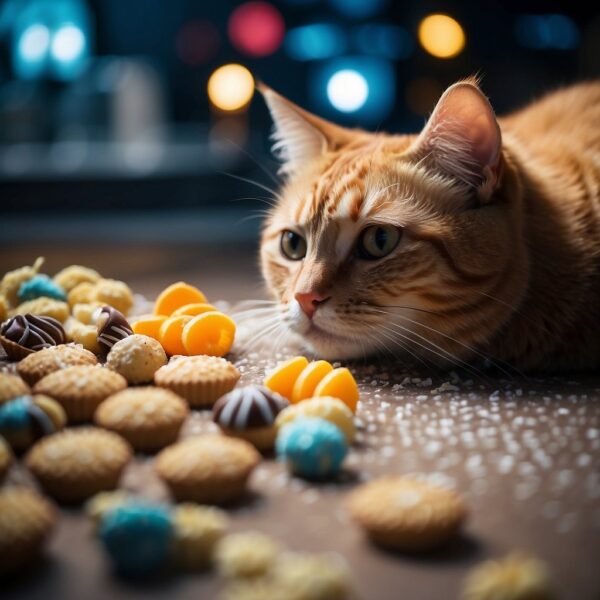
The Effects on Health of cats and Sugar
A cat eating excess sugar can significantly affect the cat’s health, particularly concerning blood sugar balance, obesity, dental health, and the risk of diabetes mellitus.
Blood Sugar and Insulin Response
When cats eat sugar, their body must regulate blood glucose levels. Unlike humans, cats lack significant levels of taste receptors for sweetness, which suggests their bodies are not designed to process high-sugar diets. Sugar ingestion can lead to a spike in blood sugar, requiring the pancreas to release insulin. A consistent rise in blood sugar can strain this process, potentially impacting insulin production and glucose regulation.
Cats and sugar: Obesity and Weight Management
Foods high in sugar can lead to weight gain and obesity in cats, as they are typically also high in calories. As obligate carnivores, cats require a protein-rich diet, and added sugars offer no nutritional value. Obesity not only affects a cat’s mobility and quality of life but also predisposes them to other health issues.
Dental Health Considerations
Sugar’s impact on dental health cannot be understated. Cats consuming sugary substances are more likely to develop plaque and tartar build-up on their teeth. This can progress to dental decay and gum disease, causing pain and difficulty eating. Proper dental care, combined with a sugar-free diet, is essential for maintaining oral hygiene.
The Risk of Diabetes Mellitus
Diabetes mellitus in cats is a disorder characterized by an inability to produce or respond to insulin properly, leading to elevated glucose in the bloodstream. A diet high in sugar can increase the risk of developing this condition. Cats with diabetes require careful management, including diet modification and potentially insulin therapy.
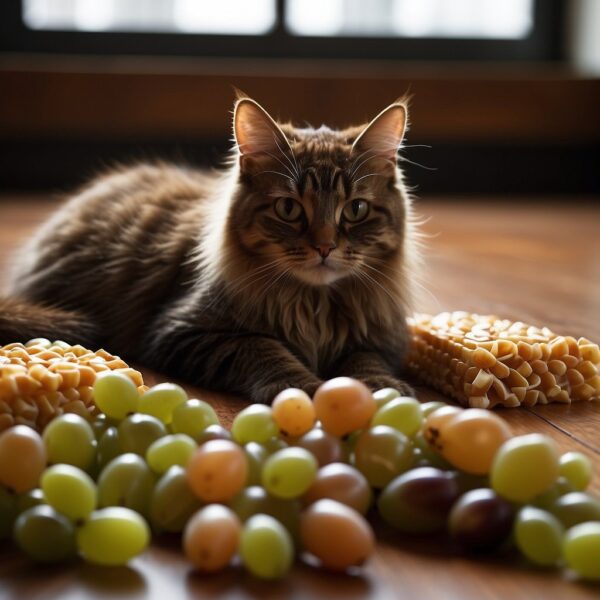
Potential Dangers and Toxic Foods
Feeding cats sugary foods not only lacks any nutritional benefit but also puts their health at risk due to certain toxic substances. Owners must be vigilant about foods that can cause more harm than a mere upset stomach.
Toxicity of Chocolate and Xylitol
Chocolate contains theobromine and caffeine, substances that are toxic to cats. Even small amounts of chocolate can lead to toxicity. Symptoms of chocolate poisoning may include vomiting, diarrhea, rapid breathing, increased heart rate, and seizures.
Xylitol, a sweetener found in many sugar-free products, is extremely toxic to cats. Ingestion can lead to a rapid release of insulin, causing hypoglycemia (low blood sugar), which can be life-threatening. Signs of xylitol poisoning include vomiting, weakness, and lack of coordination, which can progress to seizures or coma.
Other Dangerous Sweet Foods
While cats may not be attracted to sweets due to a lack of taste receptors for sugar, owners should still be cautious with other common sweet-tasting foods:
- Raisins and grapes: These fruits can cause kidney failure in cats, and the exact substance causing the toxicity is still unknown. Avoid giving these foods altogether.
- Sugary foods and drinks: Although not toxic, they offer no nutritional value and can contribute to obesity and diabetes.
Note: It’s crucial to keep these foods out of your cat’s reach and consult your veterinarian if you suspect your cat has ingested anything toxic.
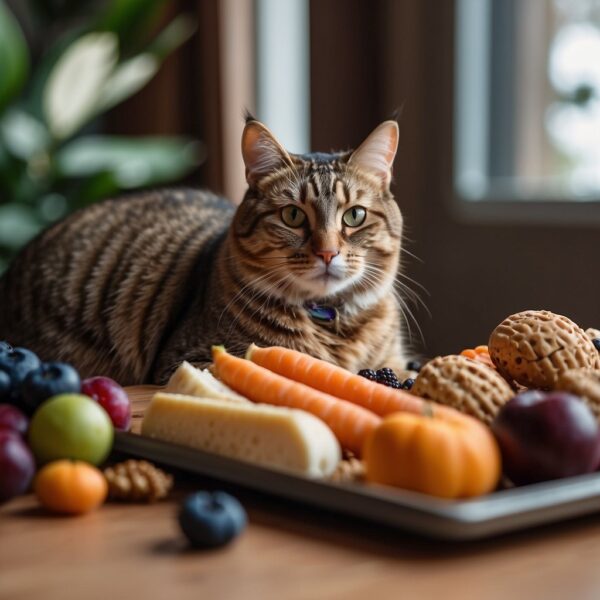
Healthy Alternatives to Sugary Treats
Cats should not eat sugary treats due to their carnivorous nature and the lack of nutritional value in sugar for felines. Healthy options exist that cater to a cat’s dietary requirements and instinctual preferences for meat.
Safe Treat Options
When considering treats for cats, it’s paramount to choose items that are safe and provide nutritional value. Here’s a list of safe treat options for cats:
- Cooked meats: Cats can enjoy small pieces of cooked chicken, turkey, or lean beef, which provide them with the protein they require.
- Commercial cat treats: Opt for high-quality commercial treats that are designed for cats, making sure they don’t contain harmful additives or excessive sugars.
Appropriateness of Different Foods
Not all foods that are safe for human consumption are appropriate for cats. Here’s a brief overview:
| Food Type | Appropriateness for Cats | Notes |
|---|---|---|
| Fruits | Generally Inappropriate | Too high in sugar and some are toxic |
| Vegetables | Occasionally Appropriate | Should be non-toxic and given sparingly |
| Dairy | Often Inappropriate | Many cats are lactose intolerant |
| Fish | Appropriate | Should be cooked and unseasoned |
Natural treats are usually the best option for cats. This includes meat, which is a part of their natural diet. When giving meat as treats, it should be cooked to avoid potential pathogens and always given in moderation.
Understanding Feline Metabolism
Cats have a unique metabolic process that is essential for their health and well-being. This section explores how cats convert food into energy, with a particular focus on their carbohydrate utilization and inherent fat content preferences.
Metabolic Pathways and Energy Sources
Cats predominantly rely on protein as their primary energy source, but their bodies also process fats and carbohydrates. Their metabolic pathways have distinct adaptations, reflective of their carnivorous evolutionary history.
- Protein Metabolism: Cats use amino acids from proteins as a central energy source, undergoing gluconeogenesis to maintain their blood glucose levels.
- Fat Metabolism: They have a higher dietary fat requirement than many other mammals. Fats provide a concentrated energy source and are important for the absorption of fat-soluble vitamins.
When it comes to carbohydrates, cats have a limited ability to digest and metabolize them. Their bodies lack certain enzymes, such as glucokinase, which plays a critical role in the metabolism of glucose in species that consume higher carbohydrate diets. Instead, cats use alternative pathways to handle the carbohydrates they do ingest.
- Carbohydrate Metabolism: Cats have a low level of activity of the enzymes needed to process carbohydrates. Despite the ability to utilize carbohydrates for energy, a diet high in carbs is not ideal, as it may lead to excess weight gain and other health issues.
It is also worth noting that cats do not have a strong drive to consume sugary foods. They lack sweet taste receptors, making them less interested in foods with high sugar content.
Signs and Symptoms of Dietary Issues
When a cat eats sugar or food with sugar, they may exhibit certain symptoms indicating dietary issues. Two common complications related to dietary problems in cats are digestive disturbances and diabetes.
Cats eating Sugar: Identifying Digestive Problems
Vomiting and Diarrhea: Cats with sensitive digestive systems may respond to sugar intake with vomiting or diarrhea. A sudden change in appetite can also be a sign of digestive discomfort. Observing the frequency and consistency of these symptoms is crucial, as intermittent issues might be less concerning than chronic problems.
Appetite Changes: A cat eating less than usual or showing disinterest in food might be experiencing stomach upset or discomfort. Conversely, an increase in appetite could also suggest digestive system irritation.
Recognizing Diabetes Signs
Increased Thirst and Urination: Excessive drinking and urination can be early signs of diabetes in cats, which often indicates the body’s inability to process glucose properly.
Weight Loss: Despite a normal or increased appetite, a cat might experience weight loss, which can signal that their body is not efficiently converting nutrients into energy.
To ensure a cat’s well-being, owners should monitor for these signs and consult a veterinarian if symptoms persist.
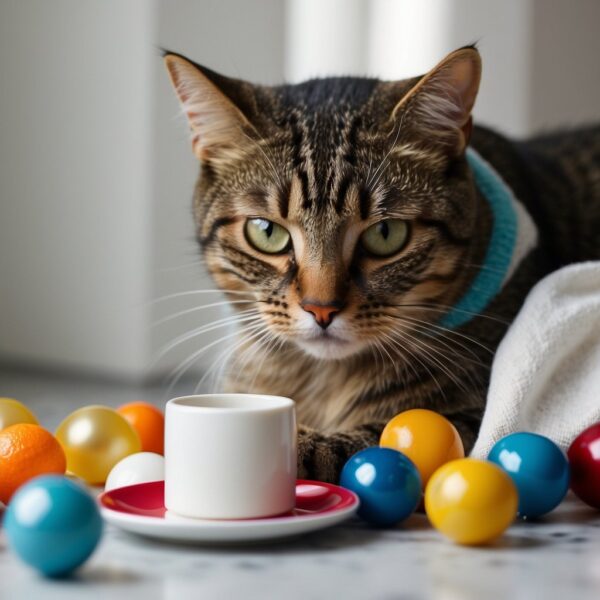
Cats and sugar: Frequently Asked Questions
In addressing common inquiries, it is essential to consider both the suitability of various foods for feline consumption and the implications of dietary choices on a cat’s well-being.
What human foods are safe for cats to consume?
Cats can safely enjoy small portions of cooked lean meats, such as chicken or turkey, and certain fish. It is crucial to avoid foods that are toxic to cats such as onions, garlic, and chocolates.
Which fresh foods are recommended for cats?
Fresh foods appropriate for cats include small pieces of cooked fish or meat and select vegetables like steamed broccoli or carrots. These should be offered in moderation as part of a balanced diet.
Is it harmful for cats to ingest sugar?
Cats lack a significant biological need for sugar, and their bodies are not suited for processing it. Ingesting sugar can lead to health issues, including obesity and diabetes.
Are there any risks associated with cats eating sugary treats?
Eating sugary treats may predispose cats to dental issues, obesity, and potentially diabetes. It is advised to avoid giving cats food with added sugars.
How does the consumption of sugar affect a cat’s health?
Regular consumption of sugar can contribute to a range of health problems in cats, such as obesity, dental decay, and diabetes, due to their carnivorous nature and inability to process sugars effectively.
Could a cat develop a preference for sweet flavors?
While cats typically do not have the taste receptor for sweetness, they may develop a preference for sugary foods if they are frequently exposed to them in their diet, which can lead to unhealthy eating habits.